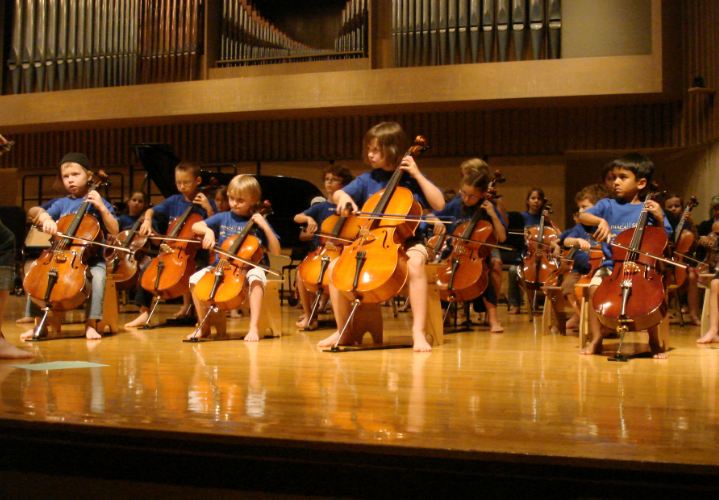 Music is a wonderful way to stimulate brain development in children from infancy through adolescence. Musical training is the best way to encourage this development, but even simple exposure can stimulate a child’s brain. Here are some of the ways that harmonized sounds help young brains.
Infants
Babies love musical instruments and lullabies. It turns out that these musical foundations not only keep babies happy, they also impact the infants’ brains in ways that will benefit them throughout life. The first three years of life are a critical time for brain development as the brain grows and develops pathways and connections between cells.
Exposure to classical pieces activates these connections and early musical instruction actually stimulates the brain to create new pathways. This helps them perform better at spatial and temporal reasoning tasks. Singing is a great way to encourage exploration of words, language development, and memory skills in babies.
Older Children and Adolescents
Thoughtfully planned musical experiences nurture all of the domains of development in children, including physical, language and literacy, thinking, and social-emotional. Music helps youth learn to understand emotions, cooperate and interact with others, build self-esteem and self-confidence, and express creativity. Incorporating musical experiences into daily life promotes this learning and development, even if it is just playing or singing one song together as a family.
Musical Training
While simple exposure to songs and melodies provides benefit to children, receiving some kind of musical training is particularly helpful during development. Learning to play an instrument helps youth develop executive function skills such as memorization, focusing on a topic, cognitive flexibility, and following multiple ideas simultaneously.
Playing an instrument is unique because it requires both hemispheres of the brain to work together. Musical training that begins in early childhood and continues through adolescence creates pathways in the brain for learning and benefits children in other areas of study.
Brain development is an important part of growing from an infant to an adult. Exposure to music and musical training helps children’s brains develop pathways and benefits them throughout life in other areas of learning and cognitive functioning.
Music is a wonderful way to stimulate brain development in children from infancy through adolescence. Musical training is the best way to encourage this development, but even simple exposure can stimulate a child’s brain. Here are some of the ways that harmonized sounds help young brains.
Infants
Babies love musical instruments and lullabies. It turns out that these musical foundations not only keep babies happy, they also impact the infants’ brains in ways that will benefit them throughout life. The first three years of life are a critical time for brain development as the brain grows and develops pathways and connections between cells.
Exposure to classical pieces activates these connections and early musical instruction actually stimulates the brain to create new pathways. This helps them perform better at spatial and temporal reasoning tasks. Singing is a great way to encourage exploration of words, language development, and memory skills in babies.
Older Children and Adolescents
Thoughtfully planned musical experiences nurture all of the domains of development in children, including physical, language and literacy, thinking, and social-emotional. Music helps youth learn to understand emotions, cooperate and interact with others, build self-esteem and self-confidence, and express creativity. Incorporating musical experiences into daily life promotes this learning and development, even if it is just playing or singing one song together as a family.
Musical Training
While simple exposure to songs and melodies provides benefit to children, receiving some kind of musical training is particularly helpful during development. Learning to play an instrument helps youth develop executive function skills such as memorization, focusing on a topic, cognitive flexibility, and following multiple ideas simultaneously.
Playing an instrument is unique because it requires both hemispheres of the brain to work together. Musical training that begins in early childhood and continues through adolescence creates pathways in the brain for learning and benefits children in other areas of study.
Brain development is an important part of growing from an infant to an adult. Exposure to music and musical training helps children’s brains develop pathways and benefits them throughout life in other areas of learning and cognitive functioning. How Music Aids Brain Development
 Music is a wonderful way to stimulate brain development in children from infancy through adolescence. Musical training is the best way to encourage this development, but even simple exposure can stimulate a child’s brain. Here are some of the ways that harmonized sounds help young brains.
Infants
Babies love musical instruments and lullabies. It turns out that these musical foundations not only keep babies happy, they also impact the infants’ brains in ways that will benefit them throughout life. The first three years of life are a critical time for brain development as the brain grows and develops pathways and connections between cells.
Exposure to classical pieces activates these connections and early musical instruction actually stimulates the brain to create new pathways. This helps them perform better at spatial and temporal reasoning tasks. Singing is a great way to encourage exploration of words, language development, and memory skills in babies.
Older Children and Adolescents
Thoughtfully planned musical experiences nurture all of the domains of development in children, including physical, language and literacy, thinking, and social-emotional. Music helps youth learn to understand emotions, cooperate and interact with others, build self-esteem and self-confidence, and express creativity. Incorporating musical experiences into daily life promotes this learning and development, even if it is just playing or singing one song together as a family.
Musical Training
While simple exposure to songs and melodies provides benefit to children, receiving some kind of musical training is particularly helpful during development. Learning to play an instrument helps youth develop executive function skills such as memorization, focusing on a topic, cognitive flexibility, and following multiple ideas simultaneously.
Playing an instrument is unique because it requires both hemispheres of the brain to work together. Musical training that begins in early childhood and continues through adolescence creates pathways in the brain for learning and benefits children in other areas of study.
Brain development is an important part of growing from an infant to an adult. Exposure to music and musical training helps children’s brains develop pathways and benefits them throughout life in other areas of learning and cognitive functioning.
Music is a wonderful way to stimulate brain development in children from infancy through adolescence. Musical training is the best way to encourage this development, but even simple exposure can stimulate a child’s brain. Here are some of the ways that harmonized sounds help young brains.
Infants
Babies love musical instruments and lullabies. It turns out that these musical foundations not only keep babies happy, they also impact the infants’ brains in ways that will benefit them throughout life. The first three years of life are a critical time for brain development as the brain grows and develops pathways and connections between cells.
Exposure to classical pieces activates these connections and early musical instruction actually stimulates the brain to create new pathways. This helps them perform better at spatial and temporal reasoning tasks. Singing is a great way to encourage exploration of words, language development, and memory skills in babies.
Older Children and Adolescents
Thoughtfully planned musical experiences nurture all of the domains of development in children, including physical, language and literacy, thinking, and social-emotional. Music helps youth learn to understand emotions, cooperate and interact with others, build self-esteem and self-confidence, and express creativity. Incorporating musical experiences into daily life promotes this learning and development, even if it is just playing or singing one song together as a family.
Musical Training
While simple exposure to songs and melodies provides benefit to children, receiving some kind of musical training is particularly helpful during development. Learning to play an instrument helps youth develop executive function skills such as memorization, focusing on a topic, cognitive flexibility, and following multiple ideas simultaneously.
Playing an instrument is unique because it requires both hemispheres of the brain to work together. Musical training that begins in early childhood and continues through adolescence creates pathways in the brain for learning and benefits children in other areas of study.
Brain development is an important part of growing from an infant to an adult. Exposure to music and musical training helps children’s brains develop pathways and benefits them throughout life in other areas of learning and cognitive functioning. 